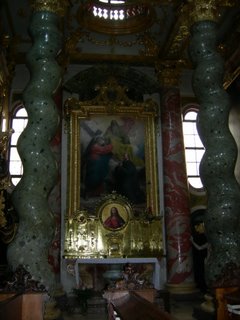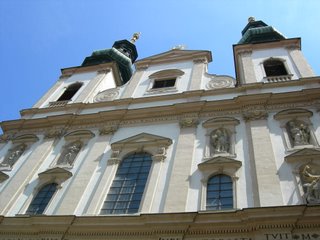

Did I say I was in Baroque Counter-Reformation post 30-years'-war land yesterday?? That was just the beginning! Yesterday morning I told you I was weak-kneed and overwhelmed at the Peterskirche, where I returned this afternoon to hear a little organ recital by Mrs. Nagy. Bach's "Liebster Jesu, wir sind hier" was the first thing on the programme, played not so impressively, as well as Christian Erbach's "Canzon a 4. del quatro (sic. that's the way Mrs. Nagy spelled it on the flyer) tono" and some sort of modern thing by a guy named Alain.
Of course, yesterday morning was before I visited the Jesuit Church (see above), with its strange trompe l'oeil dome painted by the amazing Andrea Pozzo around 1703. Pozzo wrote a treatise on this illusion and I can't describe the sensation of looking up and KNOWING it's a barrel vault and yet SEEING a high cupola dome with God peeping through at the very top. I guess my oeil was tromped.
We also went to the National Bibliothek which looks like a Baroque church, but lined with 20,000 books. The architect, Fischer von Erlach, designed it as a glorification of Charles VI, whose "apotheosis" we see painted on the dome. This "secular" churchlike building demonstrates Charles' great power through all sorts of knowledge.
Charles was NOT an "enlightened despot" of course but rather a real "absolute monarch" yet learning about Charles has made me think about how often our treatment of the Enlightenment and Baroque eras at NW school is somewhat simplistic.
I know it's necessary to simplify material for students but the Baroque era was full of that optimism and sense of limitless potential for discovery that we normally associate with the "Enlightenment." On the other hand, I get the sense that during the 17th and earlly 18th centuries we were humbler, and felt ourselves in more of a "partnership" with God, where we could discover some of the mysteries of creation, but that the real end (in a teleological sense) of our endeavors was in the hands of God. Later on, once deism reared its ugly head, I have a sense of humanity walking away from God, who might have started the whole mechanistic universe, but who has left the rest up to us.
Of course, when I call deism "ugly," it is partially because I am sitting at the moment in front of a large portrait of the founder of opus dei. He sure didn't want me to check out of the partnership with God. As far as mortification of the flesh, I do have blisters from walking around all day...


0 Comments:
Post a Comment
<< Home